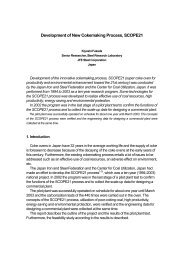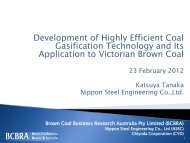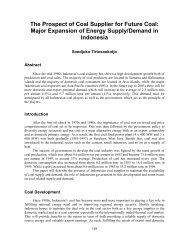Defining CCS Ready: An Approach to An International Definition
Defining CCS Ready: An Approach to An International Definition
Defining CCS Ready: An Approach to An International Definition
- No tags were found...
Create successful ePaper yourself
Turn your PDF publications into a flip-book with our unique Google optimized e-Paper software.
Appendix C: Policy Considerations and Assessments of <strong>CCS</strong> <strong>Ready</strong> EconomicsMarket Imperfections That Justify <strong>CCS</strong> <strong>Ready</strong> Policies• Project developers do not perceive economic value in making facilities <strong>CCS</strong> <strong>Ready</strong>, because they do notappreciate or they underestimate the likelihood of future requirements for GHG reductions;• There is a lack of knowledge about <strong>CCS</strong> and how it can be applied as a GHG mitigation technology forpower plants and industrial facilities;• There is much greater perception of technology risks for <strong>CCS</strong> than those seen by policymakers;• The expected future GHG allowance prices are seen as <strong>to</strong>o low <strong>to</strong> ever make <strong>CCS</strong> economic for projectsbeing designed now;• There is a misperception that potential s<strong>to</strong>rage sites are geographically ubiqui<strong>to</strong>us and simple <strong>to</strong> identify,rather than being unevenly distributed with complex characterisation processes like all other subsurfaceresources; or• Project developers do not appreciate the complexities and will not adequately investigate the availabilityand feasibility of transport and s<strong>to</strong>rage options for the plant.However, large uncertainties about GHG policy, future cost of fuels/carbon, and cost andperformance characteristics of <strong>CCS</strong> technologies can reduce the perceived economic valueof <strong>CCS</strong> <strong>Ready</strong> investments from a developer’s perspective. In addition, the “private”discount rate for cost of capital used by plant developers may be higher than the “social”discount rate that policymakers might attribute <strong>to</strong> GHG mitigation initiatives. Hence,industry might continue on a BAU path for determining plant production economics thatmay not be optimal from a broader social-cost perspective—thus, justifying some form ofgovernment-initiated <strong>CCS</strong> <strong>Ready</strong> policy. A <strong>CCS</strong> <strong>Ready</strong> policy is most justified when one ormore market imperfections, such as those indicated in the text box below, exist.Do the Society-wide Benefits Outweigh the Costs?In many jurisdictions, public policies are adopted and justified by cost-benefit analysis. Thesociety-wide economic perspective for costs and benefits encompasses the developer’scosts and revenues related <strong>to</strong> the plant’s economics and its ability <strong>to</strong> supply electricity andother products with the smallest feasible use of resources. In addition, the society-wideperspective adds other considerations such as the improvement of human capital (educationand skills formation), job creation, human health, and the reduction of environmentaldegradation. Also the society-wide perspective is often longer-term and values futurebenefits more highly (i.e., has a lower discount rate) than does the perspective of adeveloper. Basing a <strong>CCS</strong> <strong>Ready</strong> policy (including the subject industries and types of plants)on an economic rationale ensures a reasonable chance that the policy will reduce <strong>to</strong>tal longruncosts (including the time value of money) of complying with the jurisdiction’s generalGHG policy.C.2 Treatment of Uncertainty under Economic <strong>An</strong>alysesThe Considerations and Recommended Practices discuss two types of economic analyses thatmight be done as part of designing and implementing <strong>CCS</strong> <strong>Ready</strong> policies. One type isconducted by policymakers in determining whether <strong>to</strong> implement a <strong>CCS</strong> <strong>Ready</strong> policy at alland, if so, when and where it would apply. These analyses are done on the basis of socialcosts and benefits using “example” or “pro forma” cost parameters for different industryand plant types that might be considered for coming under the policy. The relevant question23 February 2010 102
















